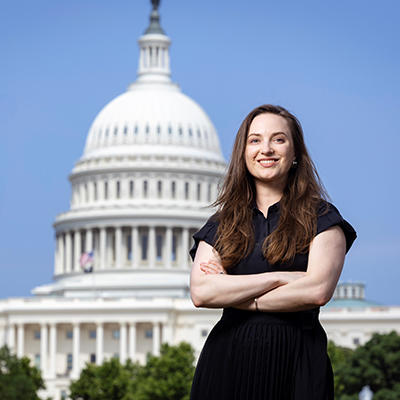
When Tetiana Khutor was 5 years old she told her parents, “We have to establish an anticorruption commission that will go to all the regions of Ukraine and check everything,” she recently recalled. The Kyiv native got the idea from watching television news programs about rampant corruption in her home country in the years following the fall of the Soviet Union.
At 8 years old, her primary school classmates were so impressed with her potential that they wrote in essays, “When Tetiana is president, she will make changes for the better,” she recalled with a laugh.
Now at 31, Khutor is doing just as predicted. She is the founder of the Institute of Legislative Ideas, a Ukraine-based think tank that devises legislative strategies and policies to combat corruption, assist asset recovery, and encourage good governance. She also teaches anticorruption policy as a professor at the National University of Kyiv-Mohyla Academy.
And since March, she has been a professor of practice at George Mason University’s Schar School of Policy and Government as an academic participating in the New School’s New University in Exile Consortium, made up of a global group of colleges dedicated to supporting scholars facing threats at home that force them to leave or prevent them from performing meaningful work. George Mason is one of 12 in the United States participating in the program.
In her case, Khutor’s research and teaching was interrupted by Russian missile attacks.
“You cannot work in such conditions,” she said. It’s not just the danger, she said, but “you want to do everything you can to help [the war effort]. To volunteer, to help Ukrainian forces. So, thinking about science and research, for scholars, it is impossible to work in such a condition.”

The war has inspired Khutor to change the focus of her studies in an effort to help rebuild the country. At George Mason, she is lecturing on “the instruments of confiscation” in seized Russian assets—billions of dollars that could be used to defend and reconstruct Ukraine.
Things are happening rapidly for her. In just her first few weeks at the Schar School, she was an invited panelist at the Ukraine Action Summit on Capitol Hill, where she addressed the need for the adoption of the Rebuilding Economic Prosperity and Opportunity for Ukrainians Act (aka the REPO Act) and the confiscation of Russian assets. The summit gathered more than 500 delegates from 47 states and convened some 350 meetings with elected officials to advocate for Ukraine. The bill was adopted.
She also served as a guest speaker in a panel discussion at the Wilson Center in Washington, D.C. She cowrote an op-ed in the widely read Washington media outlet, the Hill, about paying for Ukraine’s reconstruction. The piece was coauthored by Schar School postdoctoral researcher and European Union Marie Curie fellow Maurizio Geri.
Khutor came to the Schar School through the scholar in exile program at the behest of Distinguished University Professor Janine Wedel, a renowned expert on corruption in post-Soviet Russia and Central and Eastern Europe. Wedel said she admires Khutor’s “courage and sheer chutzpah in analyzing what’s happening and taking appropriate action. She’s very impressive.”
Khutor is the third Scholar in Exile to come to the Schar School in five years and the second at the invitation of Wedel. Other scholars previously hosted by the Schar School include Ararat Osipian and Anton Liagusha.
“I’m not interested in inviting someone who is just looking for a place to land” away from danger at home, Wedel said. “I’m looking for somebody who is truly accomplished and committed to the country, and Tetiana is a top-notch academic and practitioner. And she’s someone who can really contribute to the Schar School and what we’re trying to do.”
Wedel said Khutor can, given George Mason’s proximity and access to Washington, successfully work for her country while maintaining her nongovernment organization at home. “She has staff in place for that,” she said.
“She’s fighting like hell for Ukraine. The networking and groundwork that’s been laid for her here will make her efforts more effective when she goes back to Ukraine,” Wedel added. “She’ll go back with a wealth of new contacts and knowledge about how things operate here.”
Meanwhile, Khutor’s husband remains in Ukraine, contributing to the war effort by developing and producing drones for the Ukranian army.
“It’s hard to find any Ukrainian who is not involved in this fight,” she said.
In This Story
Related News
- July 17, 2025
- July 16, 2025
- July 14, 2025
- July 10, 2025
- July 7, 2025
